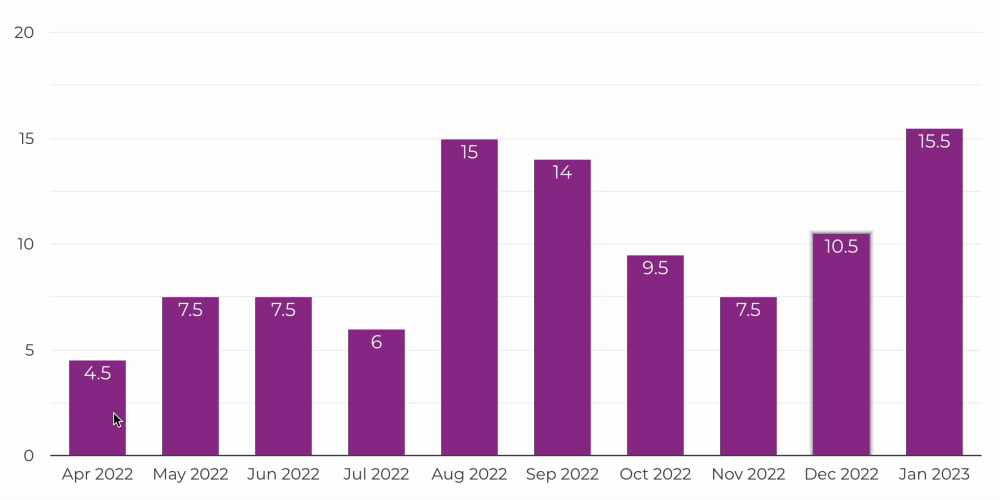Enterprise SEO ROI: How to Measure Your Organic Search Optimisation Efforts
Here’s how to justify your SEO spend and improve your bottom line.
Try Our FREE SEO ROI Calculator
How Our Clients Did Last Month
Month-over-month traffic trends. Source: Google Search Console
What Is ROI?
As any marketer knows, ROI, or return on investment, is a metric that calculates the profitability, viability, or efficiency of a particular investment. It measures what you gained or lost relative to how much money was invested. You want to know if something was worth it? Was the juice worth the squeeze? ROI is the best way to calculate that.
But since every business model earns revenue and incurs cost differently, ROI can vary. For example, an e-comm business will probably see more instant ROI because its revenue is closely tied to product sales. SaaS businesses, on the other hand, will probably experience a more drawn-out ROI because of the nature of their subscription service (and the fact that they rely on customer lifetime value rather than straightforward product sales).
So what about enterprise SEO ROI?
What Is Enterprise SEO ROI?
As an enterprise, your website represents hundreds, maybe even thousands of pages and multiple domains. With such a highly complex site, it could be difficult for your marketing team to track the financial returns generated from your SEO work—or even know what you should be measuring.
If ROI is specifically a financial calculation, then SEO ROI helps determine whether your company’s financial investment in organic SEO strategies is generating more revenue via leads than you’re spending to get them.
SEO ROI is not about quantifying brand awareness or brand power.
Sure, these things are massively important, and there are ways to quantify them, but SEO ROI should only be about how much it costs your company to generate organic leads and how much revenue those leads are generating.
We helped this DevOps consulting firm achieve a 492% ROI and £195.3K in closed deals in just 10 months.

Measure Your Business ROI
Now that you know what ROI is, let’s measure your general business ROI first.
What You’ll Need:
- An understanding of your own business model i.e. where and how does your business generate revenue?
- Data: To measure your ROI, you’ll need to know all the costs associated with your inputs as well as your revenue.
How to Measure ROI
Net Profit ➗ Total Investment ✖ 100
If your company invests £1,000,000 in acquiring new customers (for example) in a year and generates £5,000,000 in additional revenue from product sales, the ROI would be:
Your ROI = 4,000,000 / 1,000,000 × 100
Your ROI = 400%
This means that for every pound spent on making a sale, your organisation earned £4 in return.
ROI Calculator
Why Do You Need to Measure SEO ROI?
Let’s say you’re a marketing manager at a B2B software company. Your team recently invested in the services of a third-party SEO agency to improve your organic search visibility and generate more leads and sales through your website.
After six months, your boss and other stakeholders want to know if the SEO investment is paying off and if you should continue engaging with the agency.
You’ll need to know whether all this SEO has led to more traffic, lead generation, and, most importantly, more software sales. The SEO ROI will help you determine if the revenue generated from the increased visibility outweighs all the costs of SEO.
Calculating SEO ROI Is Not as Straightforward as Business ROI
If you’ve already attempted to measure SEO ROI but gave up, you’re probably not the only one. Calculating ROI for your SEO enterprise can be tricky for a few reasons:
Attribution
Attribution
Tracking a single lead’s progress from the first touchpoint all the way to that final sale is complex. For example, a single person may be exposed to your PPC ads at various points before they click on your site organically (via a search engine).
Lead Cycles
Long Lead Cycles
Unlike online B2C sales, which are relatively fast and straightforward, SEO efforts can take approximately six months from first impression to closed deal if you’re coming from a B2B SaaS or technology industry. These delays can make it challenging for your marketing team to connect the dots, especially if the sales cycle takes months or years.
Costs
Hidden Costs
You have to bear in mind that the agency’s fees aren’t the only SEO cost. You also need to factor in time, opportunity cost, employee salaries, subscription costs of various SEO tools, employee training, keeping the lights on, etc.
Benefits
The Hidden Benefits That Don’t Belong on a SEO Calculator
SEO can have such a huge impact on your company’s reputation and brand power, so you might be tempted to bake them into the ROI recipe.
We don’t necessarily disagree with this approach, but we think you’re better off calculating SEO’s influence on brand power using a separate method.
What You’ll Need to Measure Your SEO ROI
At Least Six Months of SEO Data
To get the most accurate picture of your SEO ROI, you’ll have to establish a starting point; otherwise, you’ll never know if the needle has moved by any meaningful measure. To do this, you’ll need your SEO budget, lead data and revenue figures from at least six months before hiring an SEO team.
The Sum of All SEO Costs
At the risk of sounding like a broken record, you need to know how much SEO is costing you outside the obvious agency fees.
Calculate Enterprise SEO ROI
You now have the data to measure the ROI of your enterprise’s SEO activities. The formula requires two numbers: your net profit and your total search engine optimization investment.
Your net profit includes all the revenue generated from organic traffic minus your costs, or:
Net Profit = Revenue from Organic Traffic − Total SEO Costs
Your total SEO investment is the sum of your total SEO costs.
Here’s the magic formula:
SEO ROI 🟰 Net Profit from SEO ➗ Total SEO Investment ✖ 100
If your B2B enterprise invests £500,000 in SEO in six months and generates £1,000,000 in additional revenue from organic search, you’d calculate SEO ROI like this:
SEO ROI = 500,000 / 500,000 × 100
Your SEO ROI = 100%
SEO ROI Calculator

This Agency’s Advice for Maximising Your ROI
Keyword Strategy
Develop a Comprehensive Keyword Strategy
Keyword research ensures that your SEO strategies are targeted, cost-effective, and aligned with your audience’s search intent. If you can nail this foundational step to SEO, you’ll not only maximise your budget, but you’ll also be creating content for the right audience, which will boost your conversion rates.
Performance
Optimise Your Site for Technical Performance
A site that’s been technically optimised to a high standard is an all-around solid investment that will lead to improved ROI. Not only does it give your users a slight serotonin boost when they can weave in and out of pages flawlessly without delay or without getting lost, but it’s also a ranking factor.
Your Google Core Web Vitals—which measure your page’s speed, interactivity, and stability—are all signals that your site is providing a good user experience, so Google will use this to rank you against your competitors.
The better your website works, the higher you’ll rank, which, if you follow the bouncy ball, will lead to improved SEO ROI.
Content
Create Quality Content
We have probably said this in every single page we have ever created, so why stop now? Content is king. Content is the cat’s pyjamas. Content is the coal that makes the SEO train roll. Without investing in engaging, shareable, authoritative, and well-written content, your keyword strategy may as well not exist.
Your prospective clients don’t share wordless pages with their colleagues, so if you’re on a mission to improve your SEO’s ROI, invest in content that your prospects would want to share.
SEO Efforts
Monitor and Track Your SEO Efforts
Any decent SEO agency will be tracking your progress and sharing the results via Google Analytics or Looker Studio reports. To get a better sense of your real ROI, you’ll likely have to supply your agency with your lifetime value (LTV) and pipeline data.
What About an SEO ROI Forecast?
Let’s say you want to look ahead to discover SEO’s potential on your bottom line or if hiring an SEO agency would be worth it.
To forecast your SEO ROI, you’ll need to:
- 1. Analyse your current revenue generated from organic search to establish a baseline (at least six months, depending on the length of your sales cycle).
- 2. Perform keyword research to identify new, transactional target keywords and see how much more traffic you could gain by improving your rankings with better SEO (you’ll need access to tools like SE Ranking, Ahrefs, etc. for this part).
- 3. Apply your conversion rates to the projected increase in traffic to see how much additional revenue you could generate.
- 4. Now, add up all the estimated SEO-related costs.
- 5. Use the ROI SEO calculation to get the forecasted ROI.
Still Not Quite Sure You’re Measuring the Right Data?
Still not sure you’ve measured your enterprise SEO ROI correctly? Ask your SEO agency for help. If you’re not currently working with an agency, we’d be happy to show you how to track your results.

Frequently Asked Questions About SEO ROI
It depends on several factors. It’s the same thing as asking how long it will take to see results from your SEO efforts. The answer depends on how much you’re investing in SEO, how competitive your industry is, and the state of your website when you started.
Unlike SEO, which takes around six months before your results are fully realised, seeing a positive ROI can take longer because it also depends on your site’s conversion rates, and your company’s sales cycle, profit margins, and the overall business impact of the increased traffic. For some B2B companies, that might fall in line with your SEO result timeline, but if your company has a particularly long sales cycle, it could take a few months more.
- Targeting traffic rather than leads: Going after keywords that have high search volume but the wrong intent means you’ll generate traffic, but no customers. We recommend doing the opposite whenever possible: target those people who want your services.
- Communicating how important SEO ROI is: Don’t tell your agency that they’re not meeting the expected ROI after one year. Tell them during onboarding what the expectations are—light a rocket up them!
Please see above, but yes, certainly. High-quality, relevant content that aligns with the search intent of your users is designed to drive more qualified leads to the website, which of course, increases the likelihood of conversions, and eventually ROI.
As one of the foundational steps to SEO, keyword research certainly has a role to play when it comes to maximising your SEO ROI:
- By optimising your website for relevant keywords, you can attract users who are more likely to convert into customers, which will, of course, increase your ROI.
- If maximising your ROI is your main marketing objective, you can use keyword research to find commercial-intent keywords that will attract an audience that’s already looking to buy.
Any time you follow SEO best practices, you’re maximising your ROI potential. In a nutshell, technical SEO covers page speed, performance, mobile-friendliness, site structure, and security, and so optimising your site to meet these standards will automatically improve your rankings, which will lead to more traffic, more leads, more conversions, more sales, and a better ROI.







